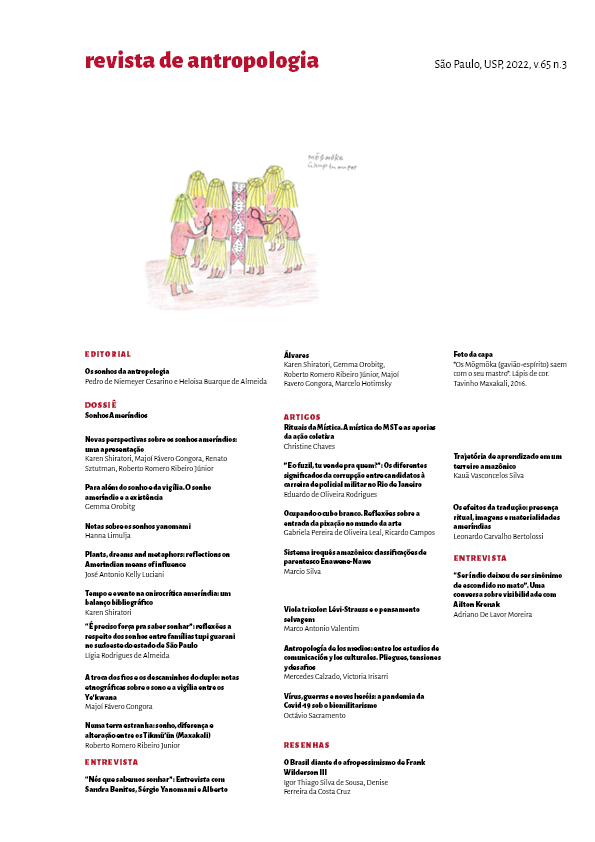An Amazonian Iroquois system: Enawene-Nawe kinship classifications
DOI:
https://doi.org/10.11606/1678-9857.ra.2022.195922Keywords:
Kinship terminology, Iroquois Systems, alliance schemes, amerindian peoples, Enawene-NaweAbstract
Iroquois kinship vocabularies are one of the most long-standing themes in social anthropology. This article resumes this long tradition. Based on first-hand ethnographic data, the text analyzes the kinship classifications of the Enawene-Nawe, an Aruak-speaking people located in Meridional Amazonia. As is typical in such vocabularies, the case being discussed does not express a prescriptive rule of marriage. Native discourse only formulates two interdictions: unions between people from the same clan and between kin who share close genealogical ties. On the other hand, the Enawene-Nawe indicate a virtuous formula of matrimonial alliance that manifests in concepts and practices: direct exchange between two families, without repetition in subsequent generations.
Downloads
References
DUMONT, Louis. 1975 [1953]. “Le vocabulaire de parenté dravidien comme expression du marriage”. In: Dravidien et Kariera : l’alliance de marriage dans l’Inde du Sud et en Australie. Paris: Mouton. pp. 85-100.
COELHO DE SOUZA, Marcela. 1995. “Da complexidade do elementar: para uma reconsideração do parentesco xinguano”. In VIVEIROS DE CASTRO, Eduardo. Antropologia do Parentesco – Estudos Ameríndios. Editora da UFRJ. pp121-206.
EARLS, John. 1971. The structure of modern andean social categories, Journal of the Steward Anthropological Society, vol.3, n.1: 69-106.
GELL, Alfred. 1975 – Metamorphosis of the Cassowaries: Umeda Society, Language and Ritual. London: Athlone.
GODELIER, Maurice; TRAUTMANN, Thomas R; TJON SIE FAT, Franklin. (eds.). 1998. Transformations of Kinship. Washington and London, Smithsonian Institution Press.
HALLOWELL, Irving. 1937. “Cross-Cousin Marriage in the Lake Winnipeg Area”. In: Contributions to Anthropology: Selected Papers of. A. Irving Hallowell. Chicago: University of Chicago Press: 317-350.
HERITIER, Françoise. 1981. L’Exercice de la parenté. Paris, Gallimard/Le Seuil.
LAFITAU, Pe. Joseph-François. 1724. Moeurs des Sauvages Américains, Comparées avec Moeurs des Premiers Temps, vol. I :552ss.
LÉVI-STRAUSS, Claude. 1966. The future of Kinship Studies (The Huxley Memorial Lecture 1965). Proceeding of the Royal Anthropological Institute of Great Britain and Ireland for 1965: 13-22.
LOUNSBURY, Floyd G. 1964. The structural analysis of kinship semantics. In: LUNT, Horace G. (Ed). Proceedings of the Ninth International Congress of Linguistics. The Hague. Pp.1073-1093.
LOWIE, Robert. 1928. A note on relationship terminologies. American Anthropologist, vol. 30: 263-268.
MORGAN, Lewis Henry. 1871. Systems of Consanguinity and Affinity of the Human Family. Smithsonian Contributions to Knowledge, No. 17, Washington, Smithsonian Institution.
MURDOCK, George. 1949. Social Structure. New York: Macmillan.
PARKIN, Robert. 1998. “Dravidian and Iroquois in South Asia”. In: GODELIER Maurice; TRAUTMANN, Thomas R; TJON SIE FAT, Franklin E. (Eds). Transformation of Kinship: Washington and London, Smithsonian Institution Press. pp. 252-270.
RADCLIFFE-BROWN, Alfred R. [1941] 1973. “Estudo dos Sistemas de Parentesco”. In: Estrutura e Função na Sociedade Primitiva. Petrópolis: Vozes.
SILVA, Marcio. 2010. Um pequeno, mas espinhoso, problema do parentesco. Ilha Revista de Antropologia, vol. 12, n. 2: 164-207.
TAYLOR, Anne-Christine. 1998. “Jivaro kinship: 'Simple' and 'Complex' Formulas. A Dravidian Transformation Group”. In: GODELIER Maurice; TRAUTMANN, Thomas R; TJON SIE FAT, Franklin E. (Eds). Transformation of Kinship: Washington and London, Smithsonian Institution Press. pp. 187-213.
TRAUTMANN, Thomas R. 2012. “Crossness and Crow-Omaha”. In TRAUTMANN, Thomas R.; WHITELEY, Peter M. Crow-Omaha – New Light on a Classic Problem of Kinship Analysis. Tucson: The University of Arizona Press.
TRAUTMANN, Thomas R.; BARNES, John. 1998. “Dravidian”, “Iroquois”, and “Crow-Omaha” in North American Perspective”. In: GODELIER Maurice; TRAUTMANN, Thomas R; TJON SIE FAT, Franklin E. (Eds). Transformation of Kinship: Washington and London, Smithsonian Institution Press. pp. 27-58
VIVEIROS DE CASTRO, Eduardo B. 1996. Ambos os três: sobre algumas distinções tipológicas e seu significado estrutural na teoria do parentesco. Anuário Antropológico, n.95. Rio de Janeiro: Tempo Brasileiro: 9-91.
VIVEIROS DE CASTRO, Eduardo. 1998. "Dravidian and Related Kinship Systems”. In: GODELIER Maurice; TRAUTMANN, Thomas R; TJON SIE FAT, Franklin E. (Eds). Transformation of Kinship: Washington and London, Smithsonian Institution Press. pp.332-385.
Downloads
Published
Issue
Section
License
Copyright (c) 2022 Revista de Antropologia

This work is licensed under a Creative Commons Attribution 4.0 International License.
Authors who intend to publish in this journal must agree with the following terms:
- a) Authors retain copyright and grant the journal the right of first publication. The work is simultaneously licensed under the Creative Commons Attribution License, which allows the work to be shared as long as the author and the initial publication in this journal are appropriately credited.
- b) Authors are authorized to sign additional contracts for non-exclusive distribution of the version of the work published in this journal (e.g., to publish it as a book chapter), as long as the author and the initial publication in this journal are appropriately credited.
- c) Authors are allowed and encouraged to publish and distribute their work online (e.g. on their personal webpage) after the editorial process, for this can generate productive changes as well as increase the impact and citation of the work. See The Effect of Open Access Publications.




